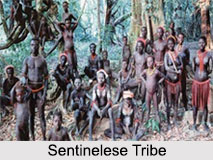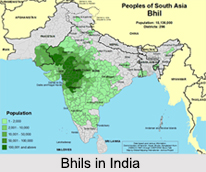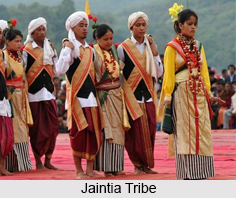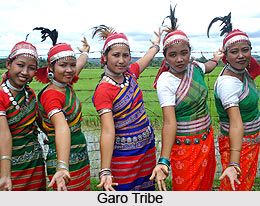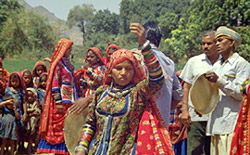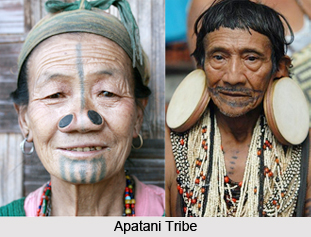 Apatani Tribes are found residing in the Ziro valley in the Lower Subansiri District of Arunachal Pradesh. They are said to have descended from a "legendary ancestor, Abotani". They have emigrated to Arunachal from various regions of north India that are situated in areas beyond Khru and Kime rivers. A number of Apatanis currently reside outside the valley. The members of the Apatani tribe have a very good physique and are medium to tall in height, matched with very fair complexion. They live in sturdy houses built of bamboo and timber. Their language belongs to the Sino-Tibetan family.
Apatani Tribes are found residing in the Ziro valley in the Lower Subansiri District of Arunachal Pradesh. They are said to have descended from a "legendary ancestor, Abotani". They have emigrated to Arunachal from various regions of north India that are situated in areas beyond Khru and Kime rivers. A number of Apatanis currently reside outside the valley. The members of the Apatani tribe have a very good physique and are medium to tall in height, matched with very fair complexion. They live in sturdy houses built of bamboo and timber. Their language belongs to the Sino-Tibetan family.
Society of Apatani Tribe
The members of the Apatani tribe can be divided into two classes, the "Gyuchii" and the "Gyuttii". Apart from this they are divided into a number of clans. However the common belief is that all of these clans have got the status of having fallen under a single tribal identity. The Apatani society is highly patriarchal. Though the different clans maintain a cordial and harmonious relationship amongst themselves, inter class marriage is strictly prohibited. Tribal "endogamy" and "clan exogamy" is the directive adopted by all the Apatani tribes. However, with the spread of education and modernity, there are instances of inter-caste marriage among the Apatanis. Monogamy as the societal norm is widely prevalent.
Religion of Apatani Tribe
The majority of Apatanis are followers of the Danyi Piilo faith. They pray to the Sun (Ayo Danyi) and the Moon (Atoh Piilo). When a misfortune occurs, they believe that it is caused by certain evil spirits, and thus they make appeasement by sacrificing chickens, cows and other domestic animals. Currently about 1,000 Apatanis declare themselves Christians, the result of the missionary work by Mizos in recent years. Even though the Apatani have incorporated many ways of the modern world, they still maintain their traditional culture and customs.
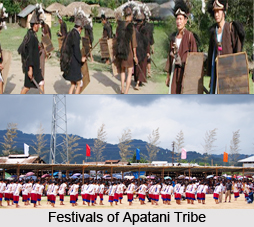 Economy of Apatani Tribe
Economy of Apatani Tribe
The Apatanis are agriculturists, producing mainly paddy. The Apatanis are good cultivators and practice both wet and terrace cultivation. Animal husbandry is another popular occupation of Apatani tribes. They rear "Mithuns" cattle, pig, goats and poultry. They practice fishing by nets, angles and traps. Hunting with the help of spears, traps and arrows are practiced. While Apatani women weave nicely, men adapts to basket crafting.
Fairs and Festivals of Apatani Tribe
Festivals and fairs are an integral part of the Apatani tribal community. Dree, Yapung, Murung and Myoko are the main festivals of the Apatanis. Dree festival is celebrated in the month of July each year, while Yapung festival is celebrated in the month of September or October. There is great merry making and dancing during the Dree festival. Another festival is usually held every year in the month of March. It is feted in a cyclical manner by creating three groups of villages. The first group consists of Hong village only. Second group of Hari and Bulla, consists of Kalong, Reru, Tajang and Lempia. The third and the last group are the villages of Michi, Hija, Dutta, Mudang Tage and Bamin. Quite a handful of Apatani tribes celebrate the festival of Murung, every year in the month of January.
The importance of all these festivals is that they all are observed with lots of enthusiasm amongst the Apatani tribes, thus ensuring better cultivation, preservation of the grains from various ill effects like storms, hailstone, insects and wild animals. They are also for the sake of welfare of villagers as well as their wealth of livestock. In the festivals and other joyful fetes, dancing and musical songs play an important role. In fact the Apatani tribes perform many traditional dances, amongst which the dances like "Daminda" and "Pakhu Ittu" dances are very popular.
Administrative System of Apatani Tribe
For better administration, there is a village council in each Apatani village consisting of one or two "Buliyang" spokesperson from each and every clan. There are 3 categories of Bulyang: "Akha Bulyang", "Yapa Bulyang" and "Ajang Bulyang". The institution still exists, but its functions have been diluted by other similar institutions like Gaon Buras and Panchayati Raj.
Related Articles
Indian Tribals
Tribes of Arunachal Pradesh
Arunachal Pradesh
Indian Tribal Festivals
Christianity

















